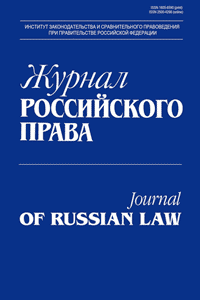This article examines the features of legal regulation pursued by the Chinese government in fighting crime. It contains, as examples, current acts of law-making which have been adopted by the legislator in the field of anti-corruption, combating the illicit distribution of narcotic (psychotropic substances), driving the vehicle while intoxicated. The article gives brief historical retrospective of the main directions in the field of crime prevention and combatting after the formation of the PRC in 1949. It is noted, that after the death of Mao and beginning of the “revolutionary” reform and transparency (1978), the Chinese society was challenged by an increasing crime rate, especially in the economic sphere. Law-maker was confronted with urgent necessity to elaborate the much needed codified acts of law-making in the field of criminal law. The Parliament would pass local Decrees in attempt to fill the gaps in the then existing legislation and which were aimed to toughen the criminal liability for new offenses. After introducing significant changes into the Criminal Code (1997) the legal regulation of the fighting against crime has reached a higher and complex stage. Over time, the Chinese legislature adopted various legal acts, the provisions of which also related to fighting against crime. Examples are: the Law “On Suppression of Money Laundering”, the Law “On Prohibition of Drugs”, etc. The analysis of said issues led to the following conclusions: China’s leadership adheres to a rigid criminal policy in the fight against the crime. This approach, according to the statistics, is justified and has already led to positive results. However, under the pressure of international community China embarked upon the path of liberalization of criminal punishment directly relating the death penalty. Due to the amendments to the Criminal Law of 2011, the number of offenses for which the offender may be sentenced to capital punishment has been reduced from 68 to 55. Legal regulation of the fight against crime in China presents not only interest from a scientific point of view but also as a big practical issue.
China, comparative jurisprudence, crime, death penalty, criminal responsibility, corruption.
1. Bichurin N. Ya. Kitay v grazhdanskom i nravstvennom sostoyanii. M., 2002.
2. Gudoshnikov L. M. Proizvol i nasilie - osnova politiki maoistov. Problemy Dal´nego Vostoka. 1974. № 3.
3. Doklad Khu Tszin´tao na otkrytii XVIII s´´ezda KPK. XVIII s´´ezd Kommunisticheskoy partii Kitaya (8-14 noyabrya 2012 g.). Ekspress-informatsiya. № 7. M., 2012.
4. Zenger Kh. fon. Stratagemy. O kitayskom iskusstve zhit´ i vyzhivat´. Znamenitye 36 stratagem za tri tysyacheletiya / pod obshch. red. V. S. Myasnikova. M., 1995.
5. Kitayskaya teoriya ugolovnogo nakazaniya za ekonomicheskie prestupleniya / pod red. Chzhan Tsyuna. Pekin, 1989 (na kit. yaz.).
6. Kurs po kriminologii / pod red. Shan Syaopin, Yan Syuefen. Pekin, 2008 (na kit. yaz.).
7. Seval´nev V. V. Protivodeystvie korruptsii: opyt KNR// Zhurnal zarubezhnogo zakonodatel´stva i sravnitel´nogo pravovedeniya. 2014. № 1.
8. Syao Chun´fey, Iyu I. Chto izmenilos´ v 2009 g.? 10 naibolee populyarnykh slov 2009. Kitay. 2010. № 1.
9. Troshchinskiy P. V. Osnovnye napravleniya bor´by s prestupnost´yu v sovremennom Kitae. Problemy Dal´nego Vostoka. 2011. № 2.
10. Troshchinskiy P. V. Osobennosti sotsialisticheskoy pravovoy sistemy s kitayskoy spetsifikoy. Zhurnal zarubezhnogo zakonodatel´stva i sravnitel´nogo pravovedeniya. 2012. № 6.
11. Troshchinskiy P. V. Yuridicheskaya otvetstvennost´ v prave Kitayskoy Narodnoy Respubliki. M., 2011.
12. Trudy Den Syaopina. Pekin, 1983.
13. Ekonomicheskie prestupleniya i protivodeystvie im / pod red. Chzhan Chzhen´fanya. Khebey, 1989 (na kit. yaz.).








